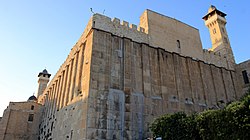Abraham in Islam
Abraham In Islam Media
The Maqam (Station) of Abraham which is believed by Muslims to contain his footprints, near the Kaaba in Al-Masjid Al-Haram
Masjid Al-Aqsa, also known as the Temple Mount, Old City of Jerusalem in Shaam, is also believed to date to the lifetime of Abraham
Cenotaph over Abraham's grave in his mosque at Hebron
Exterior view of the Cave of the Patriarchs in the Old City of Hebron, the Holy Land
In Islam, Prophet Abraham (Ibrahim in Arabic) is a very important and respected figure. In Islamic belief, he is one of the greatest prophets, and is a father of Judaism, Christianity, and Islam. His story is written in the Quran and Hadith, which identify Abraham as a role model for all believers, and describe his strong faith and obedience to God.
Early Life
Abraham was born in the city of Ur, in ancient Mesopotamia (modern-day Iraq), into a family of idol worshippers. Abraham thought that worshipping idols was useless and argued against idolatry. He began to question and reject the practices of his people.
Calling to Monotheism
Abraham's mission was to get people to worship the One True God (Allah). He challenged his father’s idol-making business and the community’s beliefs. He was thrown into a fire by King Nimrod for his beliefs, but miraculously survived.
Migration
In the Old Testament of the Bible, God commanded Abraham to leave his homeland and migrate to various regions, including Canaan (present-day Palestine), Egypt, and Mecca.
Building of the Kaaba
With his son Ismail (Ishmael), Abraham built the Kaaba in Mecca. The Kaaba is the holiest site in Islam, and is one of Abraham's most important contributions. Muslims face towards the Kaaba during salah, their daily prayers.
The Quran recounts their prayer during the construction:
“And [mention] when Abraham was raising the foundations of the House and [with him] Ishmael, [saying], ‘Our Lord, accept [this] from us. Indeed, You are the Hearing, the Knowing.’” (Quran 2:127)
The sacrifice
According to Islam, God gave Abraham a test of sacrifice. In a dream, God commanded Abraham to sacrifice his beloved son, Ismail. Both father and son agreed to follow God's command. However, as Abraham was about to kill his son, God stopped him. God accepted Abraham's obedience and faith, and provided a ram (a male sheep) to be sacrificed instead. Muslims commemorate this event annually during Eid al-Adha:
“And when he reached with him [the age of] exertion, he said, ‘O my son, indeed I have seen in a dream that I [must] sacrifice you. So see what you think.’ He said, ‘O my father, do as you are commanded. You will find me, if Allah wills, of the steadfast.’” (Quran 37:102)
Legacy
Abraham is regarded as a “Hanif,” someone who maintains pure monotheism. The Quran and Islamic tradition celebrate his unending faith, his dedication to God's commands, and his refusal to worship idols. He is often referred to as the “Friend of Allah” (Khalilullah), and is considered a spiritual ancestor of the Prophet Muhammad.
Abraham’s legacy continues to influence Islamic practices and beliefs profoundly. Muslims honor him in their daily prayers, and his life serves as a model of faith, obedience, and devotion to God.
Quranic references
- Surah Al-Baqarah (2:124-136)
- Surah Al-An’am (6:74-83)
- Surah Maryam (19:41-50)
- Surah As-Saffat (37:99-113)
Abraham’s story in Islam exemplifies the essence of submission to God’s will, a cornerstone of the Islamic faith. His life and actions are a source of inspiration and guidance for Muslims worldwide.







